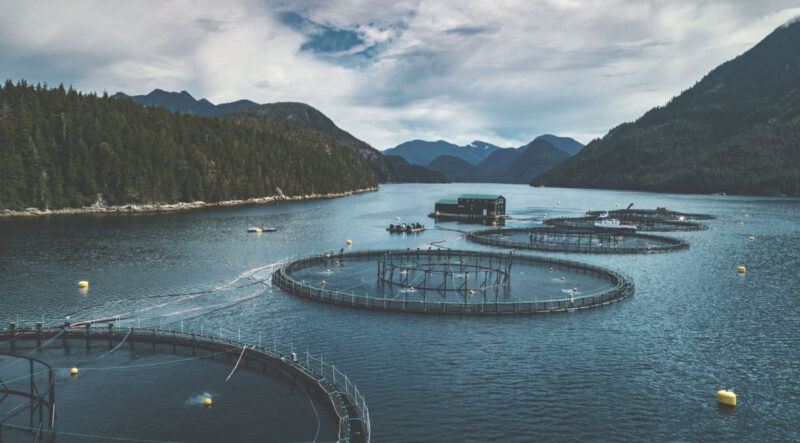Salmon farmers spend millions to define aquaculture transition
Salmon farmers move ahead with multi-million dollar projects to show how the proposed transition of open-net aquaculture operations in British Columbia, can be done.
By Fabian Dawson
SeaWestNews
As the federal government looks into coming up with a plan to transition all open-net salmon aquaculture operations on Canada’s west coast by 2025, fish farmers in BC are moving ahead with multi-million dollar projects to show how it can be done.
Grieg Seafood BC Ltd. announced yesterday that its Gold River Hatchery project on Vancouver Island, is nearing completion. It anticipates that the new facility will be able to hold smolts for an additional two months, reducing their time in the ocean by about the same.
“The new facility will effectively double our smolt capacity at our hatchery and allow us to start to explore keeping our fish in the hatchery for longer which will reduce the time required in the ocean, known as post-smolt farming,” said Rocky Boschman, Managing Director for Grieg Seafood BC.
“This is part of our overall company goal of transitioning more of our production onto land,” he said.
In total, the project represents an investment of over $25 million and the creation of almost 60 fulltime site positions at the peak of construction, the company said. The Gold River hatchery expansion will take Greig’s annual production in BC from 500 metric tonnes to 900 metric tonnes.
“We are hoping that by working with local Nations, the provincial government, and the Department of Fisheries and Oceans we will be able to help define what a transition for the industry will look like, and how we can look to invest and grow in that direction once we have industry stability,” said Boschman.
The Trudeau Liberals in a pre-election pledge, to primarily secure votes from the anti-fish farming lobby, said it will come up with a plan to transition open-net aquaculture operations in BC by 2025.
The future of salmon farming in BC could involve a range of technologies including hybrid grow-out operations, closed and semi-closed containment systems in the ocean together with an area-based management approach, said Terry Beech, the former Parliamentary Secretary to the Minister of Fisheries.
The transition process was announced as Ottawa moves ahead with the removal of salmon farms in BC’s Discovery Islands, despite nine-peer reviewed government studies that showed the marine operations had virtually no impact on wild stocks migrating through the area.
The closure of salmon farms in the Discovery Islands, which had been operating for 35 years, has already resulted in scores of people, including 80 at a fish plant in Surrey, losing their jobs.
BC’s salmon farmers, who support about 6,500 full-time, year round jobs in the province, are awaiting a judicial review of the Discovery Islands decision, while operating in an era of uncertainty.
They are currently waiting for the renewal of 79 salmon farming licences which are set to expire on June 30.
A study released last week, said British Columbia’s indigenous and non-Indigenous coastal communities will lose more than 4,700 jobs and $1.2 billion in economic activity annually if the Federal Government does not renew the farming licences immediately.
Despite operating in an era of uncertainty, BC’s salmon farmers are moving ahead with plans to help define the future of the industry.
Grieg Seafood BC Ltd., had earlier announced plans to install a form of semi-closed containment system (SCCS) at its marine aquaculture operations off the west coast of Vancouver Island in British Columbia.
The new CO2L Flow system, designed in collaboration with BC-based aquaculture technology companies, allows for salmon farmers to raise or lower custom designed farm enclosures – ensuring the farmed fish benefit from natural ocean conditions, while providing greater protection for wild salmon.
Another leading salmon farmer Cermaq Canada began testing its version of SCCS at its Millar site in Clayoquot Sound in late 2020 but halted it last October after the third stage of a four stage experiment due to a technical fault and related fish welfare issues.
“We have acquired important technical and operational knowledge and will use this to improve the performance of the SCCS in Canadian waters,” said David Kiemele, managing director at Cermaq Canada.
This SCCS system will essentially eliminate lateral contact between wild and farmed salmon, – the central issue in the polarising debate over ocean-based fish farming in British Columbia.
Other innovations being looked at include the ‘Egg’ closed-containment system, which involves growing salmon in semi-submerged tanks in the ocean, to prevent escapes and pathogen transfers from wild fish to farmed fish.
BC salmon farmers are also developing other new land-based systems that will allow them to raise juvenile farmed salmon to larger, more robust sizes before transferring them to ocean-based grow-out systems.
(Image courtesy of Grieg Seafood BC Ltd shows one of its salmon farming operations in British Columbia)

